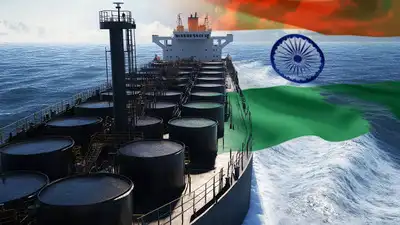How the Iran-Israel Conflict Affects India’s Oil Supply

The Strait of Hormuz serves as a crucial channel for worldwide energy transportation. (AI image)
Will the growing conflict between Iran and Israel disrupt India’s oil supply? Indian refiners are exploring alternative energy sources. They aim to secure enough fuel if Iran blocks the Strait of Hormuz due to rising tensions with Israel, according to oil industry officials.
Since the Iran-Israel tensions escalated on Friday, key figures in the oil ministry and industry leaders have been preparing. They are getting ready for potential supply issues and price changes.
India’s Oil and Gas Reserves
India has storage facilities for crude oil and petroleum products. These reserves can meet the country’s needs for 74 days. The strategic petroleum reserves cover 9.5 days of this requirement.
However, India lacks similar storage facilities for gas. The government also keeps information about oil and gas reserves confidential.
Industry leaders note that total storage includes stocks at refineries, pipeline networks, ships in transit, product storage terminals, and empty tanks. These can store both crude oil and refined products.
Understanding the Strait of Hormuz and Its Importance
The Strait of Hormuz is vital for global energy transportation. Here’s why it matters:
- The strait is 29 nautical miles wide at its narrowest point.
- About one-third of the world’s oil shipments and 20% of the world’s liquefied natural gas pass through it.
- The US Energy Information Administration (EIA) considers it the most crucial spot for oil shipments. It connects the Persian Gulf to the Gulf of Oman and the Arabian Sea.
- In 2023, approximately 20 million barrels of crude oil and refined products went through the Strait of Hormuz daily. This accounts for about 30% of the world’s oil trade.
- Most of this oil, around 70%, goes to Asia, with China, India, and Japan being the primary destinations.
Alternative Routes and Their Limitations
While there are other pipelines, they have limited capacity:
- The International Energy Agency (IEA) states that only 4.2 million barrels of crude oil can be sent through other routes daily.
- This includes Saudi Arabia’s East-West pipeline to the Red Sea and the UAE’s Abu Dhabi Crude Oil Pipeline to Fujairah.
- These alternatives can only handle about one-fourth of what usually goes through the Strait of Hormuz.
Impact on India’s Oil and Gas Imports
A closure of the Strait of Hormuz could affect 40% of India’s crude imports and 54% of its LNG supplies. This strait facilitates about 30% of the world’s oil trade and 20% of LNG shipments.
India imports 90% of its crude oil. Most of it comes from the Gulf region. About 35% comes from Russia, and over 40% comes from Gulf nations. The rest comes from Africa, the US, and other places. Imports from Africa decreased to 5% in May from 12% in April.
In 2024, India sources 54% of its LNG from the Gulf region. Qatar supplies 80% of this, and the UAE supplies the rest. Qatar is one of the top three LNG exporters globally. If Qatar’s exports are disrupted, it could increase spot LNG prices.
Prices for long-term LNG could also rise. This is because 60% of India’s long-term agreements are linked to crude oil rates.
Industry Leaders’ Perspective
Leaders from Indian refining and gas companies believe Iran is unlikely to block the strait. They argue that such a move would cause a significant price increase and involve the US. It would also harm Gulf nations and oil-dependent countries.
These leaders also point out that blocking the strait would halt Gulf exports and essential imports, including Iran’s own trade. This is a significant reason why Iran might not take this step.
Currently, Indian refiners are purchasing oil as usual. They are not panic-buying extra supplies.
Although there are contingency plans for a potential strait closure, an industry leader told ET that “closing the strait would shrink the global pool of available oil and gas. No matter how carefully you prepare, every economy would feel the impact of a supply crunch and price spike.” Another leader said, “If India turns to West Africa for more supplies, other importers are likely to follow.”
Challenges in the LNG Market
The international LNG trade is not as mature and flexible as the oil markets. There are limited options for sourcing supplies from different places. The energy crisis in 2022 highlighted this issue. A company formerly part of Gazprom failed to deliver LNG to India’s GAIL as promised. GAIL had to reduce supplies to customers in India.



